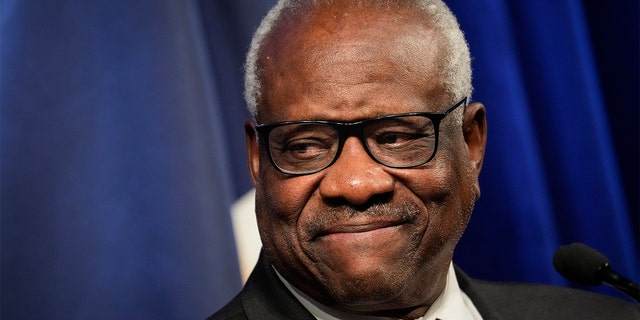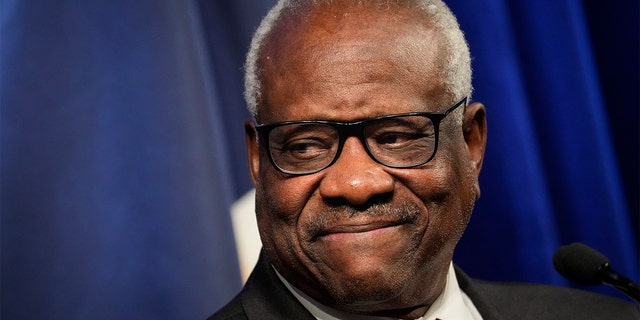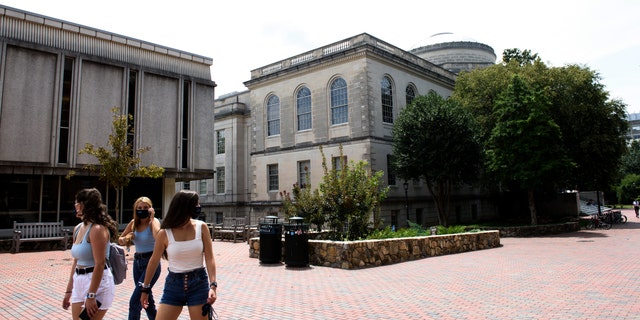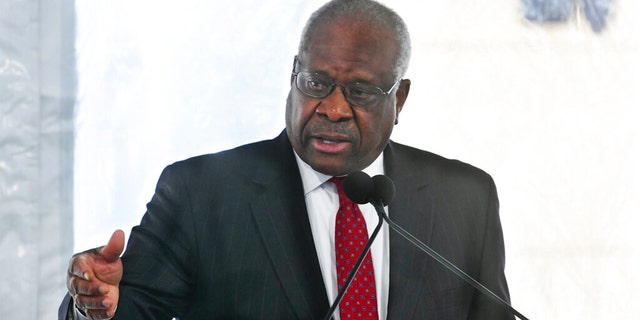
Supreme Court Justice Clarence Thomas on Monday dismissed an argument from a lawyer defending race-based affirmative action policies in college admissions and said that he doesn’t give much weight to the idea that diversity automatically creates better outcomes.
During arguments involving admissions policies at the University of North Carolina (UNC), Thomas asked state Solicitor General Ryan Park to describe the educational benefit to including race as a factor in college admissions. Park responded that in studies involving stock trading results, “racially diverse groups of people … perform at a higher level.”
“The mechanism there is that it reduces groupthink and that people have longer and more sustained disagreement, and that leads to a more efficient outcome,” Park said.
Thomas responded, “I guess I don’t put much stock in that because I’ve heard similar arguments in favor of segregation, too.”

Justice Clarence Thomas on Monday sparred with lawyers who are defending affirmative action in college admissions, saying some of their arguments reminded him of how people in past decades defended racial discrimination. (Drew Angerer/Getty Images)
“I’ve heard the word diversity quite a few times, and I don’t have a clue what it means. It seems to mean everything for everyone,” Thomas also stated during his line of questioning.
JUSTICES HEAR ARGUMENTS OVER AFFIRMATIVE ACTION IN HARVARD, UNC SUPREME COURT CASES
Normally the most reserved justice, Thomas actively participated in Monday’s oral arguments in Students for Fair Admissions (SFFA) v. University of North Carolina.
In a later discussion with David Hinojosa, the director of the Educational Opportunities Project at the Lawyers’ Committee for Civil Rights Under Law, Thomas seemed to reject the idea that affirmative action policies should continue simply because a school asserts there is a compelling interest in doing so.
“I cannot think of another area of another case where the court deferred to the alleged discriminator on something as important as compelling interest,” Thomas said.
KETANJI BROWN JACKSON CLASHES WITH ANTI-AFFIRMATIVE ACTION LAWYER DURING SUPREME COURT ARGUMENTS
Hinojosa disagreed and said that “the limited consideration of race in a holistic fashion” is not “discrimination, per se.” Hinojosa also said much of the case has involved “strict scrutiny” on whether there is a different way to achieve student body diversity without considering race.

The University of North Carolina is at the center of a major Supreme Court case that could result in affirmative action in college admissions being banned. (Melissa Sue Gerrits/Getty Images)
Thomas was unconvinced and said the court would not be so accepting of a contrary assertion by a college.
“If this was … this case involved a school district in Virginia in 1960 that is alleged to be discriminating, would this court defer to its assertion that the races do better if they’re segregated?” Thomas asked.
Hinojosa said, “That’s not this case. This case is about a limited classification involving a compelling interest.”
A TIMELINE OF SUPREME COURT CASES ON AFFIRMATIVE ACTION IN COLLEGE ADMISSIONS
“That’s not what I’m talking about. I’m talking about the court’s deference. In that case, the court would put Virginia to the test. In this case, it does not. I am asking you why the difference?” Thomas responded.
Hinojosa said University of North Carolina faced a “high burden” to justify including race as an admission factor and argued it met it.

Justice Clarence Thomas, normally one of the most reserved justices, was vocally involved in a Monday, Oct. 31, 2022, case on affirmative action in college admissions. (AP Photo/John Amis, File)
The Supreme Court is hearing two cases in which Students for Fair Admissions is suing a major university over its policy of including race as a factor in admissions decisions. The first case Monday was against UNC. The court is hearing a similar case against Harvard immediately following the UNC case.
SFFA says it is a “coalition of prospective applicants and applicants to higher education institutions who were denied admission to higher education institutions, their parents, and other individuals who support the organization’s purpose and mission of eliminating racial discrimination in higher education admissions. SFFA has members throughout the country.”
CLICK HERE TO GET THE FOX NEWS APP
The group said in its initial filing against UNC that its membership includes at least one White student who was denied admission to the university. The Harvard case set to be argued later Monday focuses more on how Harvard’s policies allegedly harm Asian-American applicants.
Those who support the use of affirmative action in college admissions cite multiple past Supreme Court precedents that say it is permissible.
Affirmative action supporters also say it is important to ensure diversity at universities, which serve as pipelines to key leadership positions in society.








